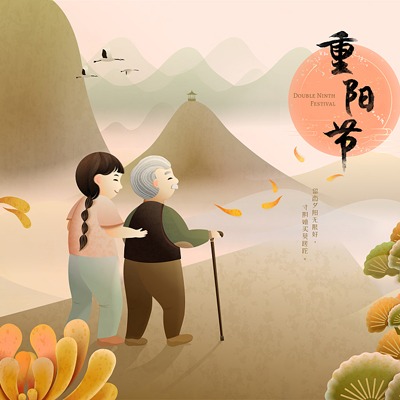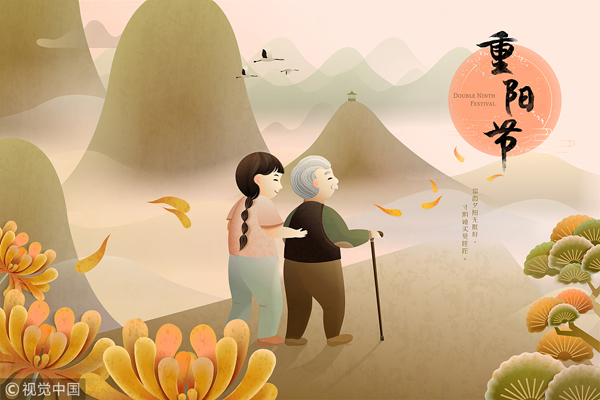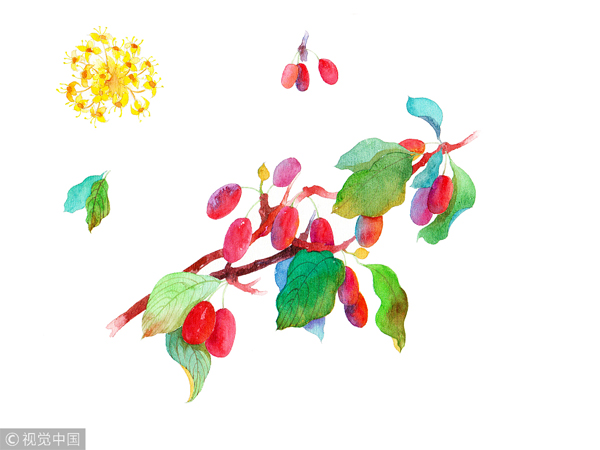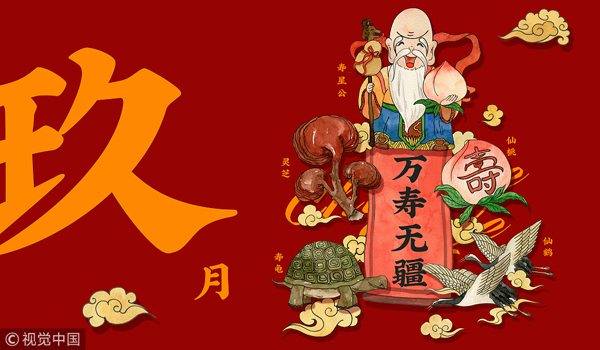


The ninth day of the ninth month of the Chinese lunar calendar is a traditional Chinese festival, the Double Ninth Festival (重阳节), which falls on Oct 17 this year.
In Chinese culture, nine has long been regarded as the number of yang (阳), making the day of the festival one of two yang numbers, while “chong” in Chinese means double - thus creating the name of the festival, Chongyang.

The Origin of the Double Ninth Festival
Like many other traditional festivals, the Double Ninth Festival also has its own story.
Legend has it that there was a man named Huan Jing (桓景), who believed that a monster would bring pestilence (瘟疫,wēn yì). He told his countrymen to hide on a hill while he went to defeat the monster. Later, people celebrated Huan Jing's defeat of the monster on the ninth day of the ninth lunar month.
Customs and Activities Of Double Ninth Festival
A traditional poem written by Wang Wei (王维) during the Tang Dynasty is often quoted in relation to the holiday, which reads,
As a lonely stranger in a foreign land,
独在异乡为异客,
dú zài yì xiāng wéi yì kè
I pine at every holiday - my homesickness increases.
每逢佳节倍思亲。
měi féng jiā jié bèi sī qīn
Far away, I know my brothers have reached the mountain peak;
遥知兄弟登高处,
yáo zhī xiōng dì dēng gāo chù
They are wearing dogwood, but one is not present.”
遍插茱萸少一人。
biàn chā zhū yú shǎo yī rén
Traditional customs of the festival include reaching a mountain peak (登高,dēng gāo), wearing dogwood (佩茱萸,pèi zhū yú), eating double ninth cake (重阳糕,chóng yáng gāo) and enjoying chrysanthemum (赏菊,shǎng jú).
What does the Double Ninth Festival mean today? Why do people climb mountains and wear dogwood on this special day?Why is the festival celebrated as "Senior Citizens Day" now? Let’s explain, one at a time.
Climbing a mountain and wearing dogwood: dodging disease and calamity
Chinese traditional festivals are often associated with awareness of natural timing. In September of the lunar calendar the sun recedes, the climate changes from warm to cold and trees and plants become withered. People have fondness and reverence for such seasonal changes.
On this day, two yang numbers are believed by the ancient people to come together and turn into their opposite, yin (阴). The qi of the earth, which is regarded as evil, rises as the qi of heaven drops (阴气上升,阳气下降). Thus, the ancients climbed high to avoid evil spirits.

As for dogwood, it is a type of Chinese medicine used by ancient people to prevent disease. People would wear a small bag filled with dogwood leaves and fruits to ward off evil (驱邪,qū xié).
"Respect for the aged" in modern China: cultural significance has not broken with tradition
The pronunciation of "9" is "jiu", the same as Chinese "久", which means "long" in English. "9" is also the biggest base number in mathematics. Thus, the festival has two "9s", and represents long life (长寿,cháng shòu).

In 1989, the double ninth day in the Chinese lunar calendar was designated the day of the elderly (老年节,lǎo nián jié).
This modern imperative to respect the elderly at the festival can be thought of as a "traditional invention," but this was not created out of nothing. The traditional custom of the festival was to reach the mountain peak to avoid disaster, and also pray for longevity.
The meaning of the festival is the pursuit of life, in both ancient and modern China. In the past, technology was backward and medical care was not as good as today. People at that time hoped to be far away from disease and disaster, in order to live a long and happy life.
So the festival's move from "climbing a mountain" to "respecting the aged (敬老,jìng lǎo)" does not break with tradition, but instead develops the tradition for the modern era.
Reporter: Fu Rui
Narrator: Charlie Clarkson
Camera: Wang Yuxi & Sun Weiwei
Light: Qiao Yuhao
Subtitles: Zhou Bing
Editing: Fu Rui & Yu Xiaoou
Producer: Liu Fang & Fu Rui (Intern)
Executive Producer: Feng Minghui
Acknowledgement: Claret’s Restaurant & Johnny Li
If you have any problems with this article, please contact us at app@chinadaily.com.cn and we'll immediately get back to you.